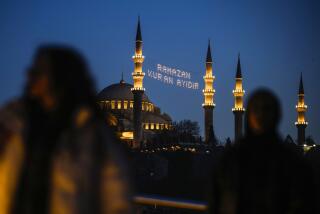Dressing to Letter of Islamic Law Pays Off for Turkish Shopkeeper
- Share via
ISTANBUL, Turkey — Mustafa Karaduman is a profoundly pious Muslim with one burning ambition in life: “to serve Islam by encouraging my sisters in faith to dress more modestly.”
Fired by such conviction, the bearded Turkish businessman has, over the last two decades, built the country’s largest Islamic-style clothing empire, Tekbir Giyim, which means “Allah Is Great Apparel.”
To those familiar with Turkish politics, it would seem a risky venture. The Islamic head scarf is at the center of a political storm that erupted earlier this month when a female Islamist lawmaker showed up at the inaugural session of parliament, her head swathed in a navy silk scarf.
Strictly banned in government offices and schools, the Islamic head scarf is viewed by Turkey’s army-backed secular elite as the foremost symbol of religious militancy.
Outraged pro-secular members led by Bulent Ecevit, Turkey’s left-wing prime minister, booed Merve Kavakci out of the chamber before she could take the oath of office. Her head scarf, thundered Ecevit after seizing the floor, “is a direct challenge to the secular principles of the Turkish Constitution.”
Kavakci is now facing charges of seeking to “incite hatred based on religious differences,” and could end up in jail.
Despite the ban on the scarves, they sell by the thousands daily at Tekbir outlets across the country.
Yasemin Takir, a slender college student wearing a flowing denim dress and clunky platform boots, is a regular customer at Tekbir’s flagship store in Istanbul’s Merter district. Like many shoppers here, she insists that her head scarf is not a political statement.
“I cover my head because the Koran orders me to do so,” she says, twirling the ends of a melon-green chiffon scarf speckled with tiny peach-colored flowers.
If anything, Karaduman has succeeded in making the head scarf a fashion statement and is earning millions of dollars doing so.
Designed by a team of stylists using the latest in computer technology, the scarves come in a variety of patterns and fabrics and can be knotted around the head in a multitude of ways. “Younger women,” Karaduman says, “go for the brighter colors and geometric prints.”
Tekbir also offers a wide selection of Islamic-style day and evening wear. “The key,” Karaduman says, “is to cover the chest, the hips and the ankles in a manner that does not tempt men, yet is pleasing to the eye.”
Upstairs at Tekbir’s design studio, Hatice Ozan, a young designer who is shrouded from head to toe in a black chador, peers over her veil at a copy of Gimbel’s Illustrated 1915 Catalog. “I want to do a Victorian-style wedding dress with a turban and veil,” she whispers shyly to her beaming boss.
The company’s hottest-selling item these days is “the Afghan,” a tunic and trousers ensemble inspired, Karaduman says, by the Afghan moujahedeen, and which “is hugely practical for the working woman.”
Karaduman, who began work as an ironing boy in Istanbul’s garment district when he was 12, says he spotted his business opportunity in the early 1980s, when the Turkish army began promoting Islam as a counterweight to communism, which was regarded as the primary threat to the nation at the time.
Buoyed by the resurgence of political Islam, Karaduman and his seven brothers opened their first shop in Istanbul’s religiously conservative Fatih district in 1982. “It was the first store of its kind,” he boasts.
Today, Tekbir has 600 outlets in Turkey and nearly 50 more overseas--including stores in Brooklyn, N.Y., and Patterson, N.J.--and he employs more than 1,500 people.
The company’s success has spawned imitators of the style. There are now 200 Islamic-style outfitters in Turkey. Karaduman says he is not worried by the competition.
“On the contrary,” he says, flashing a broad grin, “this means there are that many more of our sisters who are dressing as Allah commands them to.”
More to Read
Sign up for Essential California
The most important California stories and recommendations in your inbox every morning.
You may occasionally receive promotional content from the Los Angeles Times.










